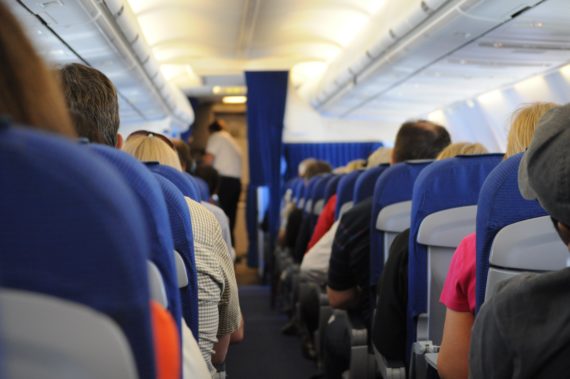
(7-26-19) From My Files Friday: In this blog, first posted in May 2015, my friend, fellow author and mental health advocate, Gabe Howard, describes how he encountered a person in crisis during an airline flight. What happened to the passenger could have been a tragedy, as all of us know. Arrest or worse. Instead, it turned out to be an example to what can happen when someone manages to de-escalate a volatile situation with patience, understanding and compassion.
Mental Illness Crisis at 35,000 Feet
By Gabe Howard
When I saw the young woman reach for the cockpit door on a recent cross-country flight, I knew there was going to be trouble.
A few moments earlier, I had watched her come down the aisle to use the lavatory at the rear of the aircraft near where I was sitting. She tried to open its door but couldn’t. She tried again.
A flight attendant noticed and told her the bathroom was occupied and that she would need to wait her turn.
The woman insisted the door was just stuck and kept struggling with it.
I was sitting close enough to see the woman’s eyes and what I saw troubled me. Total anxiety. The fear and confusion radiating off her was as clear as day to me because I had experienced panic and anxiety attacks.
The flight attendant suggested she try the rest room in the front of the aircraft. The woman started to cry, gasp for air, and whimper unintelligibly, as she returned up the aisle.
Mental Illness can cause confusion. This confusion, coupled with desperation and fear, can lead to frightening outcomes. When she reached the front, she started to grab various handles in an attempt to gain entry to the bathroom. One of those handles was the cockpit door.
Since 9/11, people aren’t allowed to form lines at the front lavatory, let alone try to open the cockpit door. It is a federal crime and the flight attendant told her to stop immediately. She refused, saying the door was stuck and she just needed to use the restroom. The flight attendant immediately stood between her and the cockpit door and gently pushed her away from the door. The woman yelled, cried, and slumped to the aisle floor. People began whispering quickly, confusion set in, and I realized this young woman was suffering from more than a panic attack. She was clearly delusional.
While some staff was defusing the situation in the front of the plane, another flight attendant came back to try to find a seat in the back to reseat the woman. Seeing this as my opportunity, I introduced myself as someone who works in mental health and offered my assistance, which was gladly accepted. I welcomed her when she was brought back to sit near me. Much of what she said was clearly not grounded in reality. She spoke of an ex-boyfriend she claimed she lived with for two years, but could produce no photos of them together, despite having several hundred pictures on her iPhone and Facebook pages. No one knew where she was, and no one was expecting her. She cried and apologized for her behavior often, saying she was bad. I comforted her and told her she was not bad; she was sick. There is a world of difference. Listening to her speak made it clear this was a woman who was sick and needed help.
The remaining four hours were uneventful. I reassured her that illness today does not mean wellness is impossible tomorrow. Through listening to her, I was reasonably certain her parents lived in the destination city, and that is what prompted her to choose to fly there, of all the available choices. Even in her delusional state, she wanted her parents. 
Once we landed, I stayed with her through the questioning that happened on the ground and, along with the incredible airline staff, helped her find her father and ensure she wasn’t left to wander the airport alone without help. She was safe, and the part of her story involving me was over.
I am a peer supporter, a person living with mental illness who has taken the classes and passed the appropriate tests to provide certain services and support to others living with mental illness. No one could have provided better services to that woman that day. Not a psychiatrist, psychologist, or therapist. It isn’t to say they couldn’t have done an equal job, but certainly not a better job.
In those moments, what she needed was compassion and understanding, but, more importantly, she needed someone she trusted quickly. Peer support isn’t about excusing behavior, it is about understanding and commiserating over shared experiences. She trusted me quickly because I was, in many regards, the same as she. While my “boarded an airplane without warning” moments are hopefully in the past, they still happened. We were able to make a quick connection and build rapport.
At 35,000 feet in the air, on a plane with 144 passengers and a four-person flight crew, we didn’t need anything other than to defuse the situation quickly, for the safety of my new friend as well as everyone else.
About the Author: Gabe is a mental illness writer, speaker, and activist. Interact with him on Facebook, Twitter, YouTube,Google+, or his website — www.gabehoward.com Gabe has written blogs for me in the past. Since writing this blog, Gabe has published his first book: Mental Illness is an Asshole. (This is a slighted edited version of Gabe’s article that first appeared on PsychCentral.)



